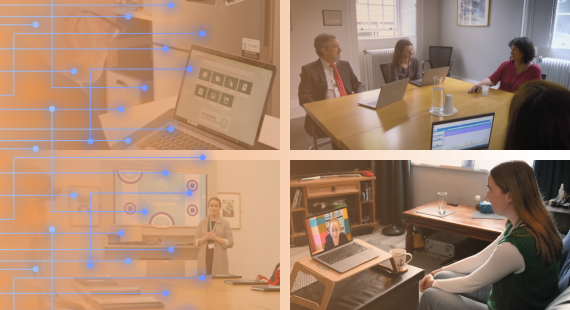
St Patrick’s Mental Health Services (SPMHS) is delighted to share our new Digital Transformation Strategy.
In SPMHS, we believe digital technologies can be used to promote positive mental health; to educate people in managing their own mental health; to provide our service users with recovery and self-management tools; and to enable the delivery of excellent care and treatment to more people.
Our new Digital Transformation Strategy outlines how, between now and 2027, we will support the delivery of our organisational strategic objectives and commitments, as set out in The Future in Mind. Through technological innovation and digital transformation, the strategy aims to enhance our services, to open up the availability of high-quality mental healthcare to more people across Ireland, and to further empower our service users as partners in their care.
Our digital achievements
Over the last number of years, we have invested in a range of technologies and digital health processes, becoming a leader in the delivery of digital mental health in Ireland.
We were the first health service in Ireland to introduce a fully integrated electronic health record (EHR), eSwift, which we launched in 2017. eSwift has improved the delivery, safety, and quality of healthcare for our service users by providing our clinical staff with better access to information, while, at the same time, protecting the privacy and confidentiality of all information.
In 2020, we again became the first health service in the country to introduce a service user portal, Your Portal. Your Portal enables the timely sharing of information with and from service users, and empowers service users to contribute to and monitor their care plans. We also launched our Service User IT Support (SUITS) service in 2020, which provides a range of technical supports for service users accessing remote care or using Your Portal.
Our digital transformation has also included the integration of new models of service delivery, including Homecare and remote care, for adult and adolescent service users.
These developments have happened alongside a range of other significant digital and technological activities and achievements across our organisation. We are now in a position to build strategically on our digital capability and experience so that we can continue to innovate and respond effectively to our national mental health needs.
Our digital vision
Our Digital Transformation Strategy is underpinned by our rights-based approach to mental healthcare, as well as being informed by our information governance framework and our Cybersecurity Strategy, which sets out the highest standards of information security for all technologies.
The strategy embeds Digital by Design - Digital First principles. This means having an organisational mindset that places digital technologies alongside service user and staff needs and experiences at the forefront of our service improvements and decision-making processes. It is also informed by the United Nations 2022-2025 Digital Strategy, which enshrines principles such as human rights at the centre of digital design, the promotion of digital accessibility and inclusivity, and the empowerment of opportunities for self-management.
The vision of the strategy is to use technology and innovation to enable us to:
- provide the highest quality support and treatment to people experiencing mental health difficulties
- involve service users as equal partners in planning, managing and evaluating the treatment and support they receive in SPMHS
- enhance our evidence-based understanding of mental health and its treatment through research
- support staff and organisations working in mental health to maintain and improve their skills
- ensure mental healthcare prevention strategies and promotion efforts in Ireland are grounded in human rights
- empower more people to live a mentally healthy life by promoting greater public understanding and awareness of mental health and reducing stigma.
As part of the delivery of this vision, we will continue to implement robust information governance and management practices and use data analysis to provide rich insight, opening a completely new way of using information to improve healthcare.
Our commitment is that we will work with our service users and staff to deliver technology in a way that supports everyone to maximise the potential of digital care delivery. This means engaging and supporting our staff and service users to embed digital processes in the ways we:
- work
- communicate
- improve and develop our services.
- facilitate wellness.
Our digital objectives
The strategy sets out seven key objectives, under which we will:
- empower and support the rights of our service users, their families and carers through digital solutions, training, and consultation
- support our staff’s competency, confidence, and engagement with the technologies required for their roles
- explore opportunities to adopt new and enhance existing technologies which support improved mental health treatment
- inform and develop the organisation’s operational excellence, efficiencies, and regulatory compliance through the power of data
- support our Research Strategy by collaborating to develop methods which enable digital research approaches and trusted use of SPMHS data
- manage our digital applications to the highest standard to assure our technology foundations are secure and sustained
- invest in our digital health team to support the delivery of our organisational strategy and operational requirements.
You can find overviews below on what we will do under each of these objectives and how we will do so.
-
Empowering and supporting service user and family rights
We will support service users’ skills and confidence in using digital technology for mental healthcare, and enhance their ability to engage with recovery and wellness tools more easily.
The remote delivery of our care pathways will be enabled, including self-care and health monitoring options.
Throughout this, we will continue to collaborate with service users and carers in designing and delivering our digital health tools and supports, and make it easier for service users and carers to interact with our services and access information.
Some of the means we will use to achieve these goals include:
- developing our SUITS service further
- having easy-to-use, accessible, and reliable systems and equipment
- creating more training resources
- providing digitised, self-guided workbooks and supporting materials in Your Portal
- implementing the use of more features in Your Portal
- enabling Your Portal for use in adolescent services
- incorporating feedback from our Remote Care User Forum and Service User Experience Surveys into service improvement plans.
-
Supporting our staff’s digital skills and engagement
Along with implementing a new Information and Communications Technology (ICT) service support system, we will communicate with staff to increase engagement with and awareness of new digital innovations and changes to current systems.
We will support our mental healthcare students and staff to meet the digital health competency standards defined by their professional bodies.
We will also engage with and support staff in various departments to further enhance their digital processes and meet the needs of departmental and organisational work practices.
To achieve these goals, we will:
- provide inclusive, relevant and accessible digital training
- develop our digital induction programme for new and returning staff
- establish an organisational-wide Digital Innovations Hub (DIH)
- collaborate with various departments to select and implement digital systems.
-
Exploring technologies which support improved mental health treatment
We will implement new and enhance existing digital solutions that enable our staff to work from where they can provide the best care and be most productive.
Digital pathways that minimise manual and paper processes will be enhanced and the use of automated solutions for reporting departmental and organisational metrics will be expanded.
We will continue to enable standardised data entry to enhance clear communications and views of service users’ clinical information. We will also support the development of digital promotion within the National Centre for Mentally Healthy Living.
Some of the ways we will achieve these goals include:
- continuing to enable remote, in-person and hybrid models of working
- developing mobile EHR solutions
- enhancing the functions and use of eSwift, based on clinical service requirements
- engaging with stakeholders to identify digital-enabling and reporting requirements
- investigating and developing digital mental health promotion and prevention strategies through Digital by Design - Digital First principles.
-
Using the power of data for operational excellence
We will increase staff’s ability to use data to inform clinical and service planning, delivery and management, and enhance the availability of real-time information to support swift access to and delivery of care.
We will develop our technical data warehousing infrastructure, capabilities, and resilience, while continuing to review and contribute to the development of national standards.
To do this, we will:
- develop data dashboards which enable staff to analyse information
- provide real-time information that supports clinical workflows within eSwift
- give feedback on relevant Health Information and Quality Authority (HIQA) standards consultations
- research, design, and deploy data warehousing solutions that will scale to our data management and analytical requirements.
-
Supporting our research strategy
We will increase the availability of information for research.
Work will be undertaken with the Academic Institute to support the investigation of digital mental health technologies, and we will share our digital learnings and work.
This will involve engaging with researchers and supporting the use of digital technologies for the efficient capture of information. It will also involve exploring how best to deliver and improve mental health treatment through technology, and participating in digital innovation networks and partnerships to exchange knowledge.
-
Managing our digital applications to the highest standard
We will assure that all data is private and secure and used or shared safely for the purpose of care and treatment delivery. Usage, access to, and performance of our applications and digital systems will be monitored.
For this, we will:
- develop and automate our applications’ monitoring and reporting
- use our knowledge of their systems to help suppliers of our applications
- implement a schedule of information governance audits.
-
Investing in our digital health team
Along with building robust recruitment and retention approaches for our digital health team, we will implement a training and mentoring system for the team.
We will also developing our in-house expertise in Digital by Design - Digital First approaches.
This will involve us building a talent pipeline with universities and colleges. We will also perform a skills maturity assessment to identify training needs, and provide training and skills development for the digital health team to achieve these goals.
Delivery of our Digital Transformation Strategy
Delivering on the objectives of our Digital Transformation Strategy will require the engagement of resources within our ICT Department and across our organisation: this will take time. While some of the goals can be progressed in parallel, decisions will need to be taken on which projects to prioritise. Early engagement in new initiatives, applying Digital by Design - Digital First principles and engaging in cross-organisational priority reviews at a senior level will be fundamental to the successful delivery of this Digital Transformation Strategy over the next four years.



